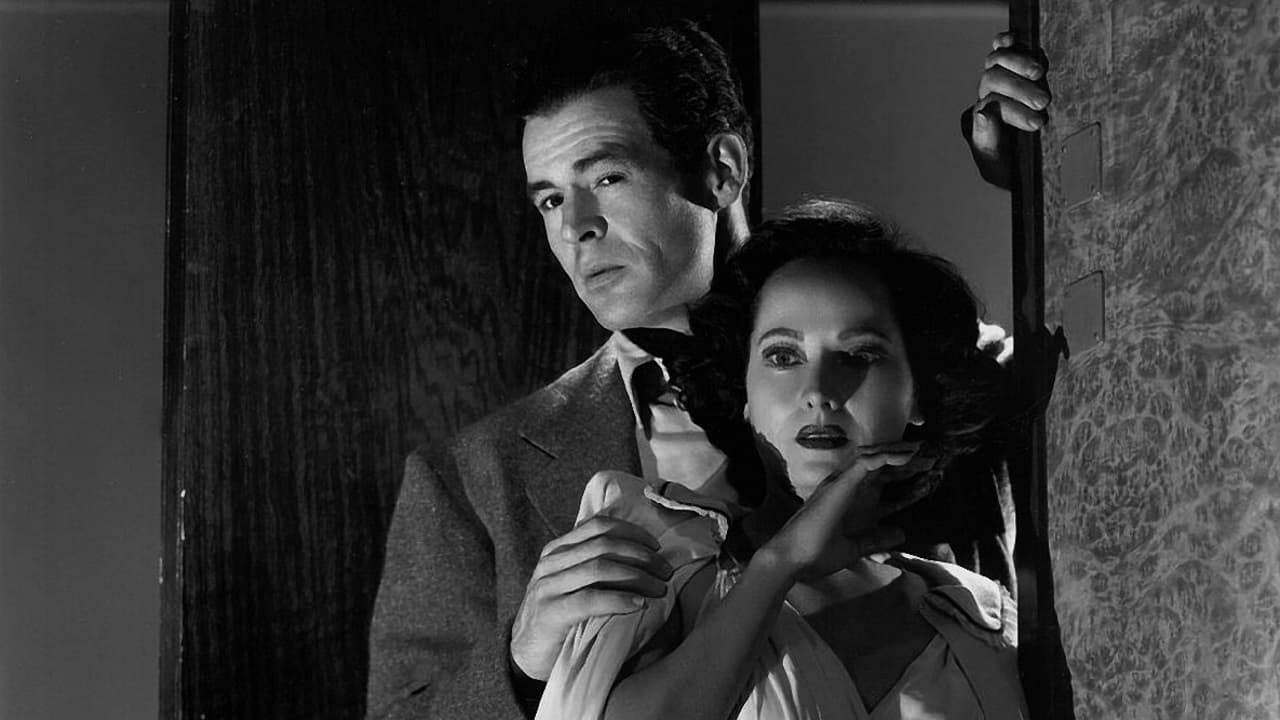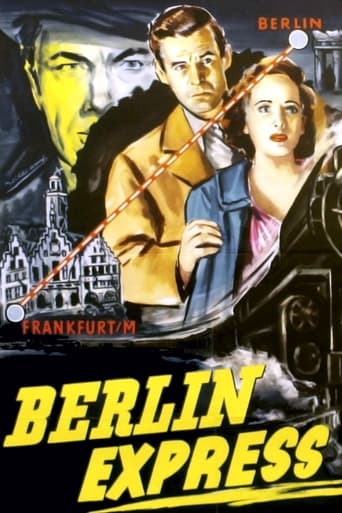Jeanskynebu
the audience applauded
Colibel
Terrible acting, screenplay and direction.
Breakinger
A Brilliant Conflict
Seraherrera
The movie is wonderful and true, an act of love in all its contradictions and complexity
morrison-dylan-fan
Despite finding Valley of Hell and Carnival of Sinners to be extraordinary films by his dad Maurice,I for some reason have never got round to seeing a title from Jacques Tourneur.Taking a look at the TV listings,I was pleased to find that the BBC were doing a Jacques Tourneur double bill,which led to me getting on the express.The plot:Going on the Express train to Berlin,the passengers find themselves having to mix with other reps of nations occupying Germany. Mistrusting him due to him never coming out of his carriage,the group are surprised to find out that potential peace maker Dr. Bernhardt.Despite their side having recently lost,a secret Nazi blows up Bernhardt's carriage. Pushing for answers, Robert Lindley,finds out that the man was an impostor,and that Bernhardt and his secretary Lucienne were pretending to be fellow passengers. Believing that he has escaped the Nazi assassins, Bernhardt crosses paths with old friend Walther,who reveals to Bernhardt that he has not gotten off the tracks.View on the film:For the opening 30 minutes,director Jacques Tourneur & cinematographer Lucien Ballard (aka:the-then Mr Merle Oberon ) intercut their moody Noir espionage with startling footage of Berlin's "Russia zone." Given the unique chance of being the first Hollywood production shot in post-war Germany and the first movie to be allowed to film in Russia's "zone" Tourneur sadly lets the chance slip out of frame.Going for a tell and show approach, Tourneur clips the Film Noir anxiety by layering Paul Stewart's narration on thick,which does not add a psychological depth to what is being shown,but just describes the images!Stopping the narration once everyone is gathered, Tourneur walks in the shadows of war-torn Berlin and Frankfurt ,casting the shadows from the destroyed buildings down on the group attempting to rid the final Nazi gasps. Dancing in the underworld of the cities in seedy nightclubs, Tourneur explores every corner with sharp tracking shoots that follow Walther sinking into the post-WWII darkness. Calling out a sincere message of unity and understanding between the occupying nations,the screenplay by Harold Medford and Curt Siodmak avoid the message becoming sickly sweet, by placing it in a gang on a mission Film Noir. Brilliantly expressing the abrasive relationship between the occupying nations allegorically on the train, the writers whip up a Film Noir storm,as Dr. Bernhardt starts to regret giving lifelong friend Walther his trust.Although carrying a poor French accent, Merle Oberon gives a sparkling performance as Lucienne,who is given an enticing flirting side by Oberon,which mask her quick-witted Femme Fatale skills.Joined by a superb support cast that include Charles McGraw and a worn-down Reinhold Schünzel as Walther, Robert Ryan gives a great, chiselled performance as Lindley. Initially being firm- handed with his opinions,Ryan wonderfully brings an ease to Lindley,as he realises that he has to work with others to keep the Berlin Express on track.
nickrogers1969
I was looking forward to this movie. It seemed promising and I had hoped for a "The Lady Vanishes" type of mystery thriller. Jacques Tourneur directed the film - the man behind "Cat People", "I Walked with a Zombie" and "Out of the Past" - all excellent films that I love."Berlin Express" was sadly disappointing to see. The film is for the most of the time not set on a train and was not very exciting at all. Only the sequence in the brewery was ingeniously filmed. The rest of the film was all talk!!!The cast was not the most memorable and Merle Oberon seemed miscast. But the real star of the film is the photography of the ruins of Frankfurt and Berlin which is fascinating to see. See the film for that alone because the film is short on suspense. The plot was tedious relying very much on coincidence and I never cared for the characters.
JoeytheBrit
A young Robert Ryan is one of a multi-national collection of characters on a train bound for Berlin where they are due to hear an address by a Konrad Adanauer style politician who is endeavouring to oversee the peaceful unification of a defeated Germany in the wake of WWII. On board the train, this disparate group of strangers, which includes the politician's secretary, a British diplomat, a Frenchman and a Russian soldier, witness what they believe to be the assassination of the politician, although they later discover that he was actually a double used to divert attention away from the real peacemaker. However, the real politician is then kidnapped by a group of Nazis intent on resurrecting the Third Reich.Berlin Express is a solid enough thriller which clearly had loftier aspirations than most mainstream thrillers, and is considerably enhanced by some location footage of war-blasted Frankfurt that adds real atmosphere to the tale. The film attempts to underline the differences between the various nationalities while simultaneously trying to emphasise the importance of the nations they represent working together to find an acceptable solution to what was clearly a delicate situation at the time. This was before the Russians zoned off their tranche of the country to claim it for Communism, and it's clear that there's a little uncertainty about how to treat their representative – a somewhat stereotypically humourless young soldier – at a time when Russia was just beginning to be perceived as the next potential threat by US politicians. 'Perhaps you should try to understand us,' Ryan's character gently admonishes the young Russian at the end of the film – words that ring particularly hollowly in the light of the hysteria which would soon grip Hollywood.Politics aside, the film provides decent entertainment. Merle Oberon fails to disguise her heady exoticism in her role as a German, but we'll forgive her that simply because she has such beguiling cheek bones. Ryan is handsome and tall – and effortlessly superior to all those around him as his unlikely comrades pretty much stand back and allow him to sort things out. There's one effective sequence in which a fatally wounded spy dressed as a clown (long story) scrambles across the dusty rubble of Frankfurt's ruins, hotly pursued by a couple of Nazi thugs. He eludes them, only to fall, dying, at our hero's feet, just enough breath left in him to whisper a key piece of information. Good stuff.
MARIO GAUCI
First-rate noir, one of many to unfold within the ominous mood of war-torn Europe (with the standard of such fare being set by next year's THE THIRD MAN). It is also one of several emanating from this era to follow a documentary-style pattern – which, however, renders it heavy-going in this case and is ultimately what dates it most of all. The title ranks it besides among a number of espionage thrillers set aboard a train; again, the template for these is THE LADY VANISHES (1938), with which this even shares one of its actors (Paul Lukas, still traveling incognito but now being the abducted party rather than the one doing the kidnapping!).Having mentioned Hitchcock's film, this is yet another effort by director Tourneur in that tradition (incidentally, he followed it with the recently-viewed CIRCLE OF DANGER [1951] and NIGHT OF THE DEMON [1957], co-scripted by Hitchcock regular Charles Bennett). In fact, the plot basically resolves itself in a handful of striking suspense sequences: an explosion in a train compartment; a kidnapping at a busy train station; a 39 STEPS-like 'memory test' in a club; a showdown in an abandoned brewery; and a near-strangling during yet another train journey ingeniously reflected in the glass of a parallel sleeping-car.The rest of the cosmopolitan cast includes American Robert Ryan (by now growing nicely as a leading man), 'French' Merle Oberon (amusingly, she confounds her fellow passengers by alternating between languages when they initially try 'hitting' on her; even if lovingly photographed by cinematographer husband Lucien Ballard, she is perhaps over-age to fill the romantic interest spot and is saddled throughout with a silly feathered hat!), Frenchman Charles Korvin (effectively emerging as the real villain of the piece), Briton Robert Coote (usually there to provide comic relief, he plays it reasonably straight in this case) and, in what constitutes a bit part (as a murder victim), German Fritz Kortner; conversely, future genre stalwart Charles McGraw's not negligible role as a high-ranking U.S. military officer is bafflingly unbilled!

